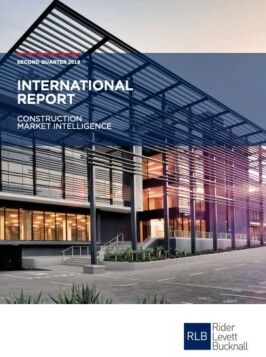The Rider Levett Bucknall (RLB) 2nd Quarter 2018 International Report showcases the positive global sentiment across the construction sector as a whole.
Since 2016, RLB has seen a general easing of pressure on increasing building costs across the globe. Countries that experienced construction cost deflation during 2016 are stabilising and forecasting positive growth in construction costs in 2018. Abu Dhabi, Beijing, Chengdu and Singapore are all forecasting positive escalation for 2018.
New Zealand
Geoff Speck, Director at RLB in Auckland said, ‘Across New Zealand, growth remains high for all regions. Auckland and Wellington continue to experience sustained growth in construction activity and work put in place, while the Christchurch rebuild has reached its peak for both residential and commercial projects.’
‘The massive losses announced by premier building contractor, Fletcher Construction, highlights the issues of New Zealand’s overheated market. This disruption is a major blow to the industry but opens up the market to new contractors,’ he added.
Auckland feels the pressure
According to RLB’s International Report, Auckland’s construction industry continues to feel the pressure of high demand and scarce resources, particularly for larger projects, which has seen an increase in construction prices and program delivery times being affected.
New dwellings not keeping up with demand
Net migration into Auckland remains exceptionally strong, although slowing and the residential sector is not currently able to keep up with the amount of new dwellings required to meet the demand. Tourism also continues to boom in Auckland, supporting new hotel developments.
There is significant work within Auckland’s CBD, with the City Rail Loop, Commercial Bay and the Skycity Convention Centre and Hotel projects continuing and other new major projects in their early phases. Many commercial and residential projects are also in full swing within the Wynyard Quarter area and city fringe, as well as a significant amount of retail projects in the wider region. The University of Auckland continues to roll out projects and continued population growth is resulting in significant investment in infrastructure projects.
Skill shortages slowing projects
Geoff continued, ‘Auckland’s subcontractor market is under resource pressure, causing poor tender responses and volatile pricing. Resource and skill base shortages are slowing projects, raising preliminaries costs and delaying the completion of projects.’
While CPI inflation is currently below 2% p.a. Auckland’s construction sector wage growth and supply shortages are impacting tender prices – 8% for 2017 and forecast at 6% for 2018.
Christchurch escalation slowing
Within Christchurch, many office space projects have been completed and are now occupied. Several key CBD anchor projects (including the Convention Centre) have progressed, which should give some certainty to the Cathedral Square area. The completion of The Crossing retail development has provided renewed impetus for CBD retail.
According to Neil O’Donnell, Director at RLB in Christchurch, ‘Escalation has slowed in Christchurch in the last period with regard to more regular projects. Considerable resources continue to be required for the Hospital and Convention Centre projects and demand by other centres are drawing resources away from Christchurch.’
Christchurch’s TPI is coming off the highs of post-earthquake works and at 3% for 2018, is now in a stable escalation climate of just above inflation.
Wellington sees good economic conditions
Wellington has seen various larger projects nearing completion with new projects about to start. Demand for office space in Wellington remains high as vacancy rates are extremely low, providing good development opportunities.
Major civil projects to the north of Wellington are ongoing and gearing up into the major concrete construction stages of the project. The work is expected to run for 2-3 years and having a significant impact on resources across the region.
No end in sight for workload
Grant Watkins, Director at RLB in Wellington noted, ‘Several large building projects are in the later design phases and are expected to come to market during the year. The workload within Wellington appears to have no end in sight given the favourable economic conditions prevailing currently.’
Labour shortages due to lack of migration
‘Subcontractor resources are stretched, leading to lack of competitive tensions and significant price increases in various trades. Many companies are experiencing labour shortages resulting from a lack of migration into the Wellington region as conditions in other regions appear more appealing,’ he said.
Wellington’s escalation continues to exceed CPI inflation levels by some margin. Expectations are that TPI movements will remain between 4% and 6% p.a. this year, but could spike higher in 2019 depending on the timing of new projects entering the market.geo
FURTHER INFORMATION:



